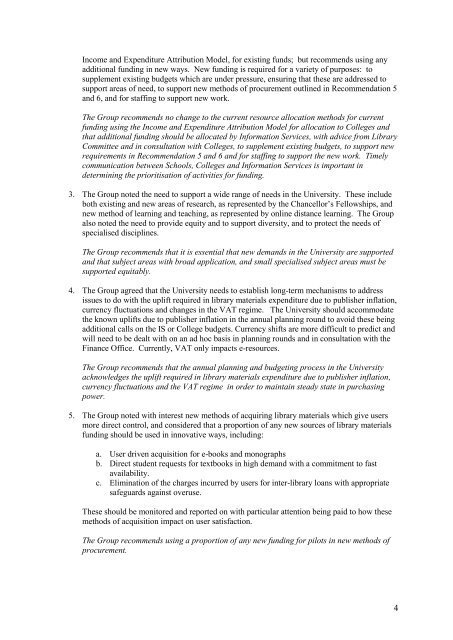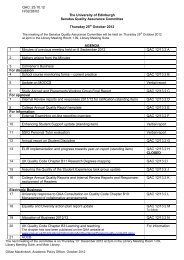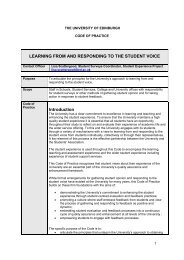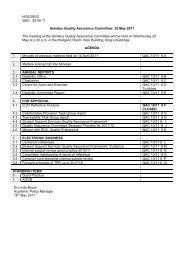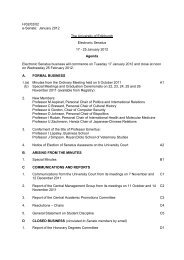Chapter 3 â Policy Implications for Gaelic - University of Edinburgh
Chapter 3 â Policy Implications for Gaelic - University of Edinburgh
Chapter 3 â Policy Implications for Gaelic - University of Edinburgh
Create successful ePaper yourself
Turn your PDF publications into a flip-book with our unique Google optimized e-Paper software.
Income and Expenditure Attribution Model, <strong>for</strong> existing funds; but recommends using any<br />
additional funding in new ways. New funding is required <strong>for</strong> a variety <strong>of</strong> purposes: to<br />
supplement existing budgets which are under pressure, ensuring that these are addressed to<br />
support areas <strong>of</strong> need, to support new methods <strong>of</strong> procurement outlined in Recommendation 5<br />
and 6, and <strong>for</strong> staffing to support new work.<br />
The Group recommends no change to the current resource allocation methods <strong>for</strong> current<br />
funding using the Income and Expenditure Attribution Model <strong>for</strong> allocation to Colleges and<br />
that additional funding should be allocated by In<strong>for</strong>mation Services, with advice from Library<br />
Committee and in consultation with Colleges, to supplement existing budgets, to support new<br />
requirements in Recommendation 5 and 6 and <strong>for</strong> staffing to support the new work. Timely<br />
communication between Schools, Colleges and In<strong>for</strong>mation Services is important in<br />
determining the prioritisation <strong>of</strong> activities <strong>for</strong> funding.<br />
3. The Group noted the need to support a wide range <strong>of</strong> needs in the <strong>University</strong>. These include<br />
both existing and new areas <strong>of</strong> research, as represented by the Chancellor’s Fellowships, and<br />
new method <strong>of</strong> learning and teaching, as represented by online distance learning. The Group<br />
also noted the need to provide equity and to support diversity, and to protect the needs <strong>of</strong><br />
specialised disciplines.<br />
The Group recommends that it is essential that new demands in the <strong>University</strong> are supported<br />
and that subject areas with broad application, and small specialised subject areas must be<br />
supported equitably.<br />
4. The Group agreed that the <strong>University</strong> needs to establish long-term mechanisms to address<br />
issues to do with the uplift required in library materials expenditure due to publisher inflation,<br />
currency fluctuations and changes in the VAT regime. The <strong>University</strong> should accommodate<br />
the known uplifts due to publisher inflation in the annual planning round to avoid these being<br />
additional calls on the IS or College budgets. Currency shifts are more difficult to predict and<br />
will need to be dealt with on an ad hoc basis in planning rounds and in consultation with the<br />
Finance Office. Currently, VAT only impacts e-resources.<br />
The Group recommends that the annual planning and budgeting process in the <strong>University</strong><br />
acknowledges the uplift required in library materials expenditure due to publisher inflation,<br />
currency fluctuations and the VAT regime in order to maintain steady state in purchasing<br />
power.<br />
5. The Group noted with interest new methods <strong>of</strong> acquiring library materials which give users<br />
more direct control, and considered that a proportion <strong>of</strong> any new sources <strong>of</strong> library materials<br />
funding should be used in innovative ways, including:<br />
a. User driven acquisition <strong>for</strong> e-books and monographs<br />
b. Direct student requests <strong>for</strong> textbooks in high demand with a commitment to fast<br />
availability.<br />
c. Elimination <strong>of</strong> the charges incurred by users <strong>for</strong> inter-library loans with appropriate<br />
safeguards against overuse.<br />
These should be monitored and reported on with particular attention being paid to how these<br />
methods <strong>of</strong> acquisition impact on user satisfaction.<br />
The Group recommends using a proportion <strong>of</strong> any new funding <strong>for</strong> pilots in new methods <strong>of</strong><br />
procurement.<br />
4


